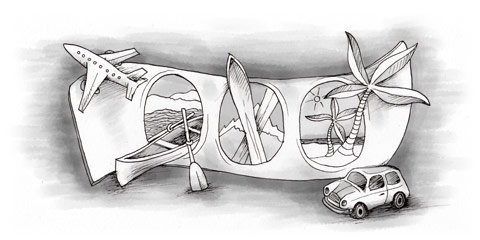British Airways (BA) is the UK’s national airline and is the western world’s largest airline with flights to over 150 international destinations. BA is part of the Oneworld alliance that includes American Airlines, Canadian Airlines, Cathay Pacific, Finnair, Iberia and Qantas. Although it’s been one of the world’s most profitable airlines, BA has made a loss in recent years with increased competition from budget airlines and a reduction in the number of business and first class passengers. BA no longer operates Concorde supersonic aircraft, which were taken out of service in autumn 2003.
The main British intercontinental opposition to BA comes from Virgin Atlantic, which is consistently rated as one of the best airlines in the world, e.g. by readers of Business Traveller magazine. Virgin has pioneered new customer values and its first an businss class services includes an on-board bar and lounge, a choice of three meals, individual seatback screens with a choice of on-demand films and seats that convert into full-length ‘beds’. British Midland, the UK’s second largest airline, has an excellent reputation for its standards of service and low fares, on domestic and international routes, and is regularly voted the UK’s top domestic carrier.
Domestic air services are provided between British international and provincial airports by a number of airlines, including Air UK, British Airways, British Midland, Brymon Airways, Capital Airlines, FlyBE and GB Airways (a BA franchise partner), most of which offer reduced off-peak and standby fares.
Like hotels, most airlines deliberately overbook as an insurance against passengers not turning up or who cancel at the last minute. The European Union has agreed a compensation scheme under which airlines are required to pay passengers denied boarding due to over-booking (‘bumped’ passengers), although compensation levels are strictly limited. BA, which claims 99 per cent of its flights are trouble-free, bumps around 10,000 passengers a year, although it at least pays some compensation (which is more than most airlines). You should check-in at least two hours before an intercontinental flight and at least one hour before a European flight – if you arrive late you may get bumped.
Allow time for traffic delays, accidents and security checks, and check with airlines for up-to-date flight information. Catching a plane in the UK (apart from a domestic shuttle flight) isn’t the same as catching a bus. If you’re flying to the continent during a public holiday period or at any time during the summer (particularly on a charter flight), you should be prepared for a delay. However, flight times are also getting longer owing to congestion.
Useful publications for frequent air travellers include the Official Airline Guides (OAG) Worldwide Pocket Flight Guide, The Complete Sky Traveller by David Beaty (Methuen) and The Round the World Air Guide by Katie Wood and George McDonald (Fontana). Frequent fliers may wish to obtain a copy of the Official Frequent Flyer Guidebook (Airpress).
Airports in the UK
There are over 100 licensed civil airports in the UK, including many international airports, the most important of which are London-Heathrow, London-Gatwick, Manchester, Glasgow, Birmingham, Luton, Edinburgh, Belfast, Aberdeen, Newcastle, East Midlands and London-Stansted (all handling over one million passengers a year). Many regional airports also operate a limited number of international flights (excluding flights to Ireland, which are widespread), including Bristol, Cardiff, Humberside, Leeds-Bradford, London-City, Lydd, Norwich, Southend and Teeside. Regional airports often have bargain fares to popular European destinations. A number of smaller airports operate scheduled domestic flights to regional and international airports.
National Express provides scheduled bus services to Heathrow, Gatwick, Manchester and Birmingham international airports from major cities. They also provide airport-to-airport services between these airports and Luton for passengers with inter-connecting flights. Major airports have direct rail and/or bus connections to local rail stations. Short and long-term parking is available at most airports, although it’s expensive (cheaper off-airport parking is usually available).
London’s Heathrow airport is the world’s busiest international airport, handling over 50 million passengers a year (Terminal 1 alone handles 20 million passengers a year), which is expected to increase to over 80 million by 2016. Heathrow has four terminals (and is planning a fifth) and handles mostly scheduled flights. London’s Gatwick airport handles over 25 million passengers a year, although it has only one runway (although an additional runway is under consideration) and just two terminals.
It’s used extensively by charter airlines. Heathrow and Gatwick have excellent bus and rail connections to central London, the provinces and other British airports. Heathrow can also be reached by tube and via the high-speed Heathrow Express direct rail connection from Paddington station, taking just 15 minutes. Many of the UK’s regional airlines are denied landing rights at Heathrow and Gatwick, and passengers are often forced to fly via the continent to pick up an international flight or must get to these airports by rail or road.
Flight information is available direct from airports and via the television teletext service. Thomas Cook publishes a comprehensive Airports Guide – Europe, containing detailed information about 75 major airports in Europe, including public transport serving airports.
Fares
Air fares to and from the UK are among the cheapest in the world. Transatlantic fares can be much lower these days thanks to greater competition between BA and Virgin (and other American carriers). BA and Virgin routinely match each others prices and, along with other airlines such as Ryanair (an Irish airline based in Dublin, but operating widely in the UK) and Easyjet, ‘give away’ thousands of tickets on certain routes during special promotions. Stiff competition from US airlines has also shaken up the transatlantic fare structure.
The low ‘shoulder’ period from Christmas to Easter is best for transatlantic bargains (prices rise sharply again in the spring), when fares are cut by up to 50 per cent. Deregulation in 1997 led to a spate of new low-cost airlines such as Easyjet (www.easyjet.co.uk ), Ryanair (www.ryanair.com ) and BMI Baby (www.bmibaby.com ), which have hit the profits of the major airlines and cemented the UK’s position as Europe’s low-cost, air travel hub. Always book online for the lowest fares (often you have no option).
Budget airlines offer a no-frills service (most operate without tickets) and undercut other airlines by charging for seats only – meals, drinks (even tea and coffee), entertainment (films, headphones) and even baggage must be paid for separately. The biggest problem facing airlines trying to gain access to a new route is the allocation of takeoff and landing slots during peak times, which are jealously guarded by major airlines (which is why new airlines must operate from smaller, less popular airports).
Most airlines provide a vast range of tickets depending on when you want to fly, how many nights you want to stay, how much notice you give, and whether you fly on a fixed (pre-booked) flight or an open ticket. Business tickets may range from standard, business return, day return, Eurobudget and Eurobudget return. (Children under 12 usually travel at 33 to 50 per cent of the adult fare – although there are no discounts on some routes – and have the same luggage allowance as adults.)
If you’ve ever wondered why airlines spend so much time and money wooing business travellers, it’s because a business class seat produces up to seven times the profit generated by an economy class seat. BA has high business class fares on some routes, particularly on routes where there’s little competition, and the difference in price between economy and business fares is much greater in the UK than in most other European countries. This may explain why many companies have cut the cost of their travel budgets in recent years by ordering executives to travel economy and use budget airlines.
Many airlines also offer discounts for youths, students and senior citizens. If you’re planning a trip abroad during school holidays, book well in advance, especially if you’re going to a popular destination, e.g. Paris or New York.
Whatever your destination, it pays to shop around for the best deal (one of the best is a round-the-world ticket from around £1,300 allowing up to 15 stops). The day of the week and the departure times of flights vary considerably between airlines and you can often save money by taking an off-peak or night flight. All airlines publish six-monthly or annual timetables.
It’s advisable to contact a travel agent that can provide you with comprehensive travel information, a detailed itinerary and all tickets at no extra cost. Also compare fares from a number of travel agents. However, you should be aware that some of the low-cost flights and holidays advertised by travel agents are limited offers, restricted to certain dates and often include hidden extras. Keep in mind also that fares on public transport to outlying (non-Heathrow) airports can cost between £10 and £18 one way.
Always make sure you fully understand any ticket restrictions. It pays to be wary of tickets offered by bucket shops (outlets which sell cheap airline tickets) and anyone who’s not an International Air Transport Association (IATA) travel agent, as there’s a lucrative trade in forged tickets. To find a cheap flight, check the classified advertisements in daily and Sunday newspapers (e.g. The Sunday Times and Observer) and entertainment magazines, such as London’s Time Out. The best deals for students are usually offered by STA Travel and Campus Travel.
It’s best to book holiday flights with a company with an Air Travel Organisers’ Licence (ATOL) issued by the Civil Aviation Authority, as ATOL pays compensation should a member be unable to meet its commitments (020-7453 6427/6430 for information). Holidays booked through a member of the Association of British Travel Agents (ABTA) are also covered by a bond system (020-7637 2444).
Luggage
The size, weight and number of items of hand luggage vary according to the airline and the class of your ticket (most airlines allow first and business class passengers extra hand luggage). The luggage allowance on flights from the UK is usually 15kg for charter flights, 20kg for economy class, and 30kg for business and first class passengers.
All additional bags should be checked in at the airline check-in desk for carriage in the aircraft hold – obtain a check-in stub as, without it, you cannot claim for compensation if it’s lost or stolen. On flights to and within the US, around 10 per cent of hold luggage is opened for security checks and if cases are locked they’re broken open, therefore it pays you not to lock bags when travelling there. Keep any valuables in your hand luggage and make sure your luggage is fully insured.
Prohibited items and substances are listed in airport and airline information leaflets and guides, including Can I Take It? Dangerous Articles in Baggage and Cabin Baggage available from BA offices and appointed travel agents. You may not carry any sharp items in hand luggage, including tweezers, nail files and clippers, and scissors (can you attack an airhostess with a pair of nail clippers?).
If in doubt, ask the airline with which you’re travelling. Don’t pack electronic equipment such as personal computers and cameras in your hold luggage, but keep them in your hand luggage. If you have a portable computer, it’s wise to have it checked by hand, as data could be erased or corrupted by powerful X-ray machines. Passengers are requested not to leave their luggage unattended at any time at British airports, as it may be stolen or taken away by security staff.
This article is an extract from Living and working in Britain. Click here to get a copy now.


